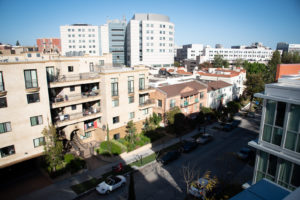This new weekly podcast series brings you the biggest news from around the world, across the country and on campus every Friday, and we tell you how these stories affect UCLA students. Podcasts editor Jack Garland and Podcasts contributor Kayla Hayempour discuss the Israel-Hamas war, Congress’ temporary funding bill and more on this edition of This Week. Later in the episode, they are joined by assistant News editor Sharla Steinman to discuss her interview with LA City Councilmember Katy Yaroslavsky.
Jack Garland: Today is Friday, November 17. And you are listening to This Week by Daily Bruin Podcasts.
This is the very first episode of our new weekly podcast series. Every Friday, we’ll recap the biggest news of the week from around the world, across the country and right here on campus. And then we’ll explain to you how these stories affect UCLA students. I’m Jack Garland, and I’m the Podcasts editor.
Kayla Hayempour: And I’m Kayla Hayempour, a third-year Podcasts contributor.
JG: And later on, we’ll be joined by an editor from the Daily Bruin News section.
KH: Okay, before we get into the news, Jack, do you have a highlight from this week?
JG: Actually, my highlight from this week hasn’t happened yet. I’m really excited for this USC game on Saturday. Should be a fun game, and hopefully we get the result that we’re looking for. What about you, Kayla? Any highlights?
KH: Oh, I have to agree with you. I’m definitely excited to beat the Trojans. I just hope that we don’t get rained on too much. Okay, let’s get into the news. What is the top international story from this week?
JG: So, obviously, the Israel-Hamas war has been dominating the headlines. It began on October 7, when militants from Hamas crossed from the Gaza Strip into Israel and killed about 1,200 Israelis, many of which were civilians. And they also took about 240 civilians hostage and those hostages remain in captivity in Gaza. So Israel declared war on Hamas and began a bombing campaign on the Strip. Hamas is the organization that has governed Gaza since it won elections in 2006. And it’s considered a terrorist organization by the U.S. The health ministry in Gaza, which is part of the Hamas-controlled government, has reported over 11,200 deaths from the war.
KH: This conflict is definitely developing really rapidly. Can you give us the latest update?
JG: Yeah, so Israel now has military personnel inside Gaza. And they have told Gazans to evacuate to the south. But there just isn’t that much room in Gaza. It’s only about 25 miles long altogether. The Israeli forces have surrounded Gaza City, the largest population center in the Gaza Strip. It’s home to about a fourth of the population. And earlier this week, Israeli special forces entered the Al-Shifa Hospital, which is the largest hospital in Gaza, and they were looking for Hamas fighters. Israel and the U.S. claimed that Hamas forces operate in tunnels that are underneath the hospital. So this situation in Gaza appears to get more dire by the day. On Thursday, the United Nations World Food Programme said that the people of Gaza face an immediate possibility of starvation. And as for the Israeli hostages in Gaza, it seems like there is a dialogue between the two sides, but there has been no significant gains in returning those hostages to Israel.
KH: So like you mentioned, Israel and the U.S. have been in communication. And historically they’ve been allies for quite some time now. What has the U.S. been doing?
JG: Yeah, the U.S. has shown pretty much unwavering support for Israel in their efforts to remove Hamas from power. Secretary of State Blinken has also met with Arab leaders in the region to try to prevent the war from spreading. And then as humanitarian conditions for the civilians in Gaza have gotten worse in the last week or so, the US has supported pauses in the hostilities to allow for aid to enter into war zones and for civilians to get out.
KH: Obviously, this conflict has been on everyone’s mind, but it is happening thousands of miles away in the Middle East. Can you give some more background on how this affects students on campus?
JG: Yeah, well, there are a lot of students at UCLA who have a personal connection to this conflict. Some may have family members in Israel or in Gaza, or have close ties to the populations there. So obviously, this is a very difficult time for those students. So I think it’s important for all students at UCLA to empathize with those students and show our support for them.
KH: As much attention as this war is getting, what else is happening around the world?
JG: There was a meeting between President Biden and President Xi of China Wednesday in San Francisco, and that meeting occurred on the sidelines of a larger conference of Pacific nations. The relationship has been very tense for the last few years now between the U.S. and China, so every time they can meet is important. In the meeting, they covered many topics. It seems like there may be some progress on keeping communication open between the two countries, especially the militaries. And Xi agreed to curb the export of ingredients that are used to make fentanyl, the deadly drug that kills thousands of Americans every year. There’s also currently a civil war in Sudan, which hasn’t gotten much attention. It began after a military coup removed the government that was supposed to transition the country to democracy. And since mid-April, the government forces have been fighting the paramilitary Rapid Support Forces, or the RSF. And a recent multi-day attack by the RSF in the Darfur region reportedly killed 800 people. So unfortunately, there’s no end in sight there. Now, transitioning to the national news, what’s the biggest story from this week, Kayla?
KH: Well, our lawmakers have been getting busy. On Tuesday, the House passed a stopgap spending bill narrowly avoiding a government shutdown by just a few days. It was led by new House Speaker Mike Johnson. But the bill faced opposition from other House Republicans, including the House Freedom Caucus. It ended up going to the floor through a unique suspension of the rules. The bill did eventually pass on a 336 to 95 bipartisan vote with overwhelming support from 209 Democrats and 127 Republicans. Now the legislation is going to go to the Senate, which has to put it through to President Biden’s desk before the deadline on Friday the 17th.
JG: So assuming that the bill does pass, what happens next?
KH: So the passage basically temporarily funds government agencies until new deadlines in early 2024, which gives Congress a little bit more time to pass the full fiscal spending bills. Departments like agriculture, transportation, Veterans Affairs, and housing and urban development will now have their funding expire on January 19. And then all other sectors like defense will expire on February 2. Biden requested 106 billion for spending decisions on foreign aid to Israel and Ukraine as well as US border security. But that was pushed to next year. So that won’t be happening under this spending bill.
JG: So it seems like the parties have gotten some of what they wanted, and they had to compromise on some points. How are they generally feeling about the passage of this bill?
KH: Well, people on the far right of the Republican caucus are definitely a little unhappy. They were looking for deeper spending cuts. But you know, Johnson countered this, he said that this was just a first step in fighting for Republican principles. He also noted that it was a much needed break for members of Congress. They’ve been in session for 10 weeks. So I think everybody was ready to avoid a shutdown and just get this moving as soon as possible.
JG: And how does the passage of this bill affect UCLA students?
KH: Well, if this bill didn’t pass, we’d be facing a full blown government shutdown. That would mean that all publicly funded agencies and employees would go into the New Year unpaid, and a bunch of other daily services like food stamps, and even air travel can be disrupted. Stores are actually unable to renew their EBT licenses during a shutdown, which means if they expire, Bruins that are trying to use their EBT cards for groceries, it would be denied. Transportation construction could also slow or stop completely, which impacts the metro line currently being built near campus. Longer government shutdowns could have even worse effects on Bruins. They could halt federally funded research and even potentially affect students’ financial aid programs.
JG: So good that we have that bill passed for now.
KH: Definitely.
JG: What else is happening around the country?
KH: The Supreme Court refused to reinstate Florida’s Protection of Children Act, which most people refer to as the anti-drag show law, which is a loss for DeSantis. You know, he’s on the campaign trail right now. So we’ll see how that affects his polling numbers. In good news, inflation was flat in October from the previous month, giving hope that food and energy prices will soon even out. Also, the I-10 freeway fire that I’m sure a bunch of us got phone notifications for is being attributed to arson, but it is estimated to be repaired in three to five weeks, so hopefully we’ll all see a little bit of an ease up on traffic. In music news, famous rapper Sean Combs, also known as P Diddy, is being accused of rape and physical abuse in a lawsuit filed against him by his ex-girlfriend. There isn’t a lot of information yet about a trial or potential conclusion. So we’ll have to wait and see how the story develops.
JG: A lot going on. Thanks for those updates, Kayla.
Now, we’re joined by Sharla Steinman, the assistant editor for the City and Crime beat in the News section of the Daily Bruin. Hey Sharla, how’s it going?
Sharla Steinman: Hello, Jack. Hello, Kayla. Nice to be here.
JG: Thanks for joining us. Now, tell us about a story from the News section this week.
SS: Yeah, so this week we published an interview with Councilmember Katie Yaroslavsky. She’s our city council member in District Five. We talked about a variety of topics including homelessness, housing and transportation. On homelessness, we discussed the Midvale Interim Housing Unit that was just approved by the LA City Council. So out of the 17,000 units we have in LA, only 99 of them are in our district. So there’s a big shortage of interim housing in our area. She spoke about numerous factors she looked for in planning for the site, including city owned parcels, proximity to public transit and financial feasibility.
JG: So why is the Midvale Interim Housing Site important?
SS: So in our district, we have senior housing, we have family housing, and we have senior veteran housing. But if you’re an adult between 18 and 55, there really isn’t a lot of space for just you. We also talked about housing affordability in Westwood, so she said that LA City Council recently passed a motion that Councilmember Yaroslavsky had brought to the council. And that codified Mayor Bass’s executive directive one, which makes it much easier and faster to build affordable housing. However, she did say that a big part of the issue is not having adequate public transportation to actually get to campus. So Councilmember Yaroslavsky said that a stop at UCLA on the Sepulveda transit corridor is critical. This will allow students to live in areas of the city that are more affordable and still be able to go to UCLA.
JG: It sounds like that stop in Westwood would be very helpful for UCLA students. Do we have any timeframe on when that project will be complete?
SS: Yeah, so the Sepulveda transit corridor is still in its really early stages. And it’s currently in its environmental review portion, which is the second of five stages. Multiple options are being discussed, including a mono rail and heavy rail. And Councilmember Yaroslavsky said that she anticipates the project being completed by 2035.
JG: Oh, I think I’ll be graduated by then. Hopefully —
SS: I hope so —
JG: But I think future UCLA students will definitely benefit from that new stop.
SS: Totally.
JG: Thanks for coming on, Sharla.
SS: Thank you. It was great, guys.
KH: That’s all we have for today. Thank you for joining us. Next week, we’ll be off for Thanksgiving. And then we’ll be back week 9 and week 10. See you then.






Comments are closed.